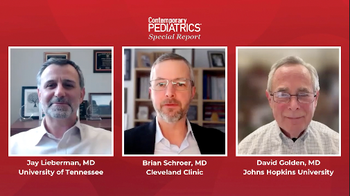
Editorial: A team effort to use antibiotics wisely
Advice to pediatricians from a wise source.
EDITORIAL
A team effort to use antibiotics wisely
The 2-year-old boy in your office has a fever and a runny nose. He's a little crankier than usual, and maybe he's been pulling at his left ear. His appetite is pretty normal for his age. You find nothing worrisome when you examine him (OK, maybe the left tympanic membrane could move a little better, but it's not discolored or bulging). Yet his mother tells you that her day-care provider will bar him from attending unless he's being treated with an antibiotic, and that she really needs to get back to work.
Prompted by an increase in the rate of resistance among common pathogens, public and professional dialogue over inappropriate antibiotic use has intensified in the past several years. It isn't difficult to understand why antibiotics might be overused. First, only rarely are we able to determine with certainty the cause of a given set of symptoms; the toddler whose presentation I just described is probably infected with a respiratory virus, but there are no practical ways to be sure about that. Second, antibiotics work (or at least they used to), and it's discomforting to a physician to withhold treatment that might relieve symptoms or prevent more serious disease. Third, it's easier to document successful treatment than effective prevention: When was the last time you heard a news story about an infant who avoided ear infections because her parents had stopped smoking?
In this issue of Contemporary Pediatrics, which offers a focus on infectious disease, the article by Rita Mangione-Smith, MD, on page 63 provides an approach to dealing with parents' expectations when a child has an infection that, in your judgment, does not require antibiotic therapy. As is the case with virtually all encounters between physicians and patients or their parents, discussion about an infection that doesn't warrant antibiotic therapy is likely to go more smoothly if, first, there is an established relationship during which the physician has demonstrated concern and accessibility and, second, the parents have sought medical care appropriately in the past. Without such a relationship, antibiotics are more likely to be used as a safeguard by a physician who doesn't know the parents, and antibiotics are more likely to be requested by parents who have no basis on which to assess the physician's judgment or diagnostic acumen.
Curbing inappropriate use of antibiotics will be a team effort. Each member of the teamphysician, parent, patient, day-care provider, school nursehas an important role to play, but we won't know the game plan unless we communicate in the huddle.
Julia A. McMillan, MD, editor-in-chief of Contemporary Pediatrics, is professor of pediatrics, vice chair for pediatric education, and director of the residency training program, Johns Hopkins University Medical School, Baltimore.
Julia McMillan. Editorial: A team effort to use antibiotics wisely.
Contemporary Pediatrics
2001;10:9.
Newsletter
Access practical, evidence-based guidance to support better care for our youngest patients. Join our email list for the latest clinical updates.



